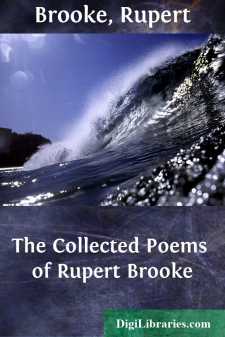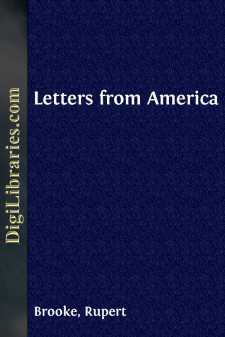Categories
- Antiques & Collectibles 13
- Architecture 36
- Art 48
- Bibles 22
- Biography & Autobiography 813
- Body, Mind & Spirit 142
- Business & Economics 28
- Children's Books 17
- Children's Fiction 14
- Computers 4
- Cooking 94
- Crafts & Hobbies 4
- Drama 346
- Education 46
- Family & Relationships 57
- Fiction 11829
- Games 19
- Gardening 17
- Health & Fitness 34
- History 1377
- House & Home 1
- Humor 147
- Juvenile Fiction 1873
- Juvenile Nonfiction 202
- Language Arts & Disciplines 88
- Law 16
- Literary Collections 686
- Literary Criticism 179
- Mathematics 13
- Medical 41
- Music 40
- Nature 179
- Non-Classifiable 1768
- Performing Arts 7
- Periodicals 1453
- Philosophy 64
- Photography 2
- Poetry 896
- Political Science 203
- Psychology 42
- Reference 154
- Religion 513
- Science 126
- Self-Help 84
- Social Science 81
- Sports & Recreation 34
- Study Aids 3
- Technology & Engineering 59
- Transportation 23
- Travel 463
- True Crime 29
The Collected Poems of Rupert Brooke
by: Rupert Brooke
Description:
Excerpt
Rupert Brooke was both fair to see and winning in his ways. There was at the first contact both bloom and charm; and most of all there was life. To use the word his friends describe him by, he was "vivid". This vitality, though manifold in expression, is felt primarily in his sensations — surprise mingled with delight —
"One after one, like tasting a sweet food."
This is life's "first fine rapture". It makes him patient to name over those myriad things (each of which seems like a fresh discovery) curious but potent, and above all common, that he "loved", — he the "Great Lover". Lover of what, then? Why, of
"White plates and cups clean-gleaming,
Ringed with blue lines," —
and the like, through thirty lines of exquisite words; and he is captivated by the multiple brevity of these vignettes of sense, keen, momentary, ecstatic with the morning dip of youth in the wonderful stream. The poem is a catalogue of vital sensations and "dear names" as well. "All these have been my loves."
The spring of these emotions is the natural body, but it sends pulsations far into the spirit. The feeling rises in direct observation, but it is soon aware of the "outlets of the sky". He sees objects practically unrelated, and links them in strings; or he sees them pictorially; or, he sees pictures immersed as it were in an atmosphere of thought. When the process is complete, the thought suggests the picture and is its origin. Then the Great Lover revisits the bottom of the monstrous world, and imaginatively and thoughtfully recreates that strange under-sea, whose glooms and gleams and muds are well known to him as a strong and delighted swimmer; or, at the last, drifts through the dream of a South Sea lagoon, still with a philosophical question in his mouth. Yet one can hardly speak of "completion". These are real first flights. What we have in this volume is not so much a work of art as an artist in his birth trying the wings of genius.
The poet loves his new-found element. He clings to mortality; to life, not thought; or, as he puts it, to the concrete, — let the abstract "go pack!" "There's little comfort in the wise," he ends. But in the unfolding of his precocious spirit, the literary control comes uppermost; his boat, finding its keel, swings to the helm of mind. How should it be otherwise for a youth well-born, well-bred, in college air? Intellectual primacy showed itself to him in many wandering "loves", fine lover that he was; but in the end he was an intellectual lover, and the magnet seems to have been especially powerful in the ghosts of the men of "wit", Donne, Marvell — erudite lords of language, poets in another world than ours, a less "ample ether", a less "divine air", our fathers thought, but poets of "eternity". A quintessential drop of intellect is apt to be in poetic blood. How Platonism fascinates the poets, like a shining bait! Rupert Brooke will have none of it; but at a turn of the verse he is back at it, examining, tasting, refusing. In those alternate drives of the thought in his South Sea idyl (clever as tennis play) how he slips from phenomenon to idea and reverses, happy with either, it seems, "were t'other dear charmer away". How bravely he tries to free himself from the cling of earth, at the close of the "Great Lover"! How little he succeeds!...



